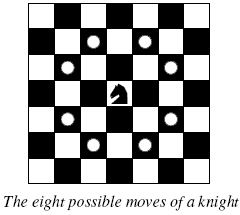|
A Knight's Journey
Description  Background
Background
The knight is getting bored of seeing the same black and white squares again and again and has decided to make a journey around the world. Whenever a knight moves, it is two squares in one direction and one square perpendicular to this. The world of a knight is the chessboard he is living on. Our knight lives on a chessboard that has a smaller area than a regular 8 * 8 board, but it is still rectangular. Can you help this adventurous knight to make travel plans? Problem Find a path such that the knight visits every square once. The knight can start and end on any square of the board. Input
The input begins with a positive integer n in the first line. The following lines contain n test cases. Each test case consists of a single line with two positive integers p and q, such that 1 <= p * q <= 26. This represents a p * q chessboard, where p describes how many different square numbers 1, . . . , p exist, q describes how many different square letters exist. These are the first q letters of the Latin alphabet: A, . . .
Output
The output for every scenario begins with a line containing "Scenario #i:", where i is the number of the scenario starting at 1. Then print a single line containing the lexicographically first path that visits all squares of the chessboard with knight moves followed by an empty line. The path should be given on a single line by concatenating the names of the visited squares. Each square name consists of a capital letter followed by a number.
If no such path exist, you should output impossible on a single line. Sample Input 3 1 1 2 3 4 3 Sample Output Scenario #1: A1 Scenario #2: impossible Scenario #3: A1B3C1A2B4C2A3B1C3A4B2C4 Source
TUD Programming Contest 2005, Darmstadt, Germany
|
#include <stdio.h>
#include<string.h>
int dx[8]= {-1,1,-2,2,-2,2,-1,1};//按字典顺序走必须这么写
int dy[8]= {-2,-2,-1,-1,1,1,2,2};
int visit[50][50],way[100][2];//visit记录是否访问。way记录路径
int p,q;
int dfs(int x,int y,int r)//x,y记录当前所在位置。r记录下一步为第几步
{
int nx,ny,i;
if(r-1==p*q)//如果已经走完则输出
return 1;
for(i=0; i<8; i++)
{
nx=x+dx[i];
ny=y+dy[i];
if(nx<1||nx>p||ny<1||ny>q||visit[nx][ny])
continue;
visit[nx][ny]=1;
way[r][0]=nx;
way[r][1]=ny;
if(dfs(nx,ny,r+1))
return 1;
visit[nx][ny]=0;
}
return 0;
}
int main()
{
int t,i,k;
scanf("%d",&t);
for(k=1; k<=t; k++)
{
scanf("%d%d",&p,&q);
memset(visit,0,sizeof visit);
way[1][0]=way[1][1]=1;
visit[1][1]=1;
printf("Scenario #%d:\n",k);
if(dfs(1,1,2))
{
for(i=1; i<=p*q; i++)
printf("%c%d",way[i][1]-1+'A',way[i][0]);
printf("\n");
}
else
printf("impossible\n");
if(k!=t)
printf("\n");
}
return 0;
}
 骑士周游问题
骑士周游问题








 本文介绍了一个经典的计算机科学问题——骑士周游问题。该问题要求在给定大小的棋盘上找到一条路径,使得国际象棋中的骑士能够遍历每一个格子恰好一次。文章提供了完整的C语言实现代码,包括深度优先搜索算法的应用。
本文介绍了一个经典的计算机科学问题——骑士周游问题。该问题要求在给定大小的棋盘上找到一条路径,使得国际象棋中的骑士能够遍历每一个格子恰好一次。文章提供了完整的C语言实现代码,包括深度优先搜索算法的应用。
















 1664
1664

 被折叠的 条评论
为什么被折叠?
被折叠的 条评论
为什么被折叠?








